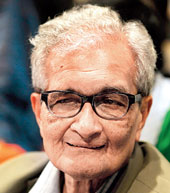 |
| Amartya Sen at the cancer foundation lecture. (Amit Datta) |
Don’t ban smoking, but strongly discourage it, is Amartya Sen’s prescription for reducing cancer cases.
“I do believe in personal liberty. But you can’t force other people to smoke passively,” the Nobel laureate said at the second foundation lecture of Cancer Foundation of India on Cancer in India: How Serious A Challenge?
Sen, himself a cancer survivor, said he did not support complete prohibition of smoking “but (it) needs discouraging in a much stronger way”. Citing the example of China, he said: “China has a long rule book on that issue.”
India’s life expectancy, though higher than before, is still only 64.4 years because of widespread habits such as smoking and chewing of tobacco, Sen said, adding that 40 per cent of cancer deaths in India in the age group of 30 to 69 are tobacco- related. He said cancer deaths cannot be curbed without serious efforts to reduce tobacco consumption.
Sen also blamed inadequate public healthcare facilities and overdependence on private healthcare, poverty, lack of basic education and gender inequality for growth of cancer incidence in the country. “India has moved prematurely in relying on private healthcare,” he said. “Unless there is a strong public healthcare system, it’s difficult for private healthcare to operate.”
China, according to Sen, spends 2.3 per cent of its gross national product (GNP) on healthcare compared to India’s expenditure of 1.4 per cent of its gross domestic product (GDP). GDP includes products produced within a country’s borders and GNP products produced by enterprises owned by a country’s citizens.
According to Sen, this was one of the main reasons for average life expectancy in China being a high 73.5 years. He said lack of access to proper medical check-up, diagnosis, medical advice and treatment for the poor and unavailability of drugs were the major causes for high occurrence of cancer in non-affluent countries.











